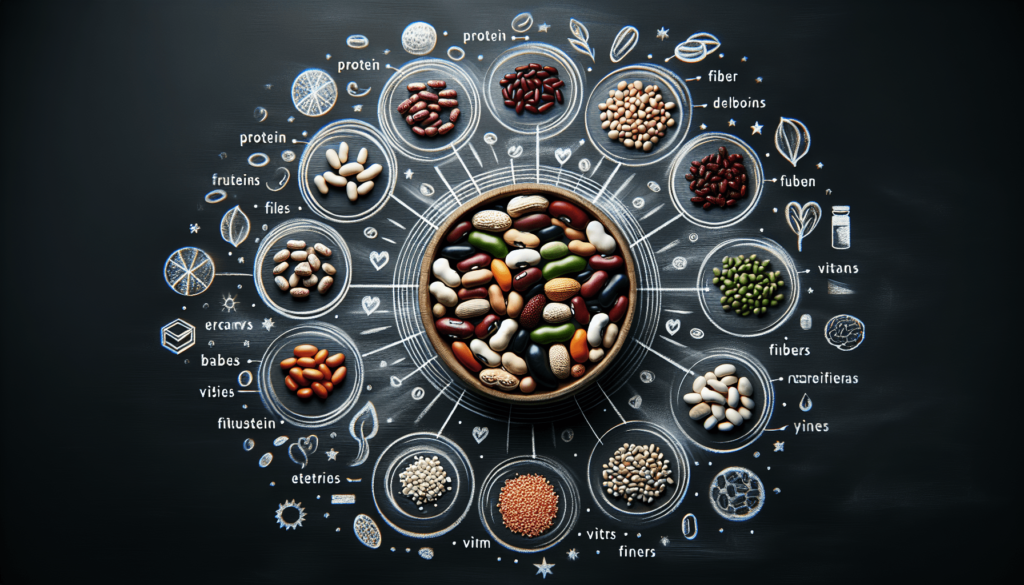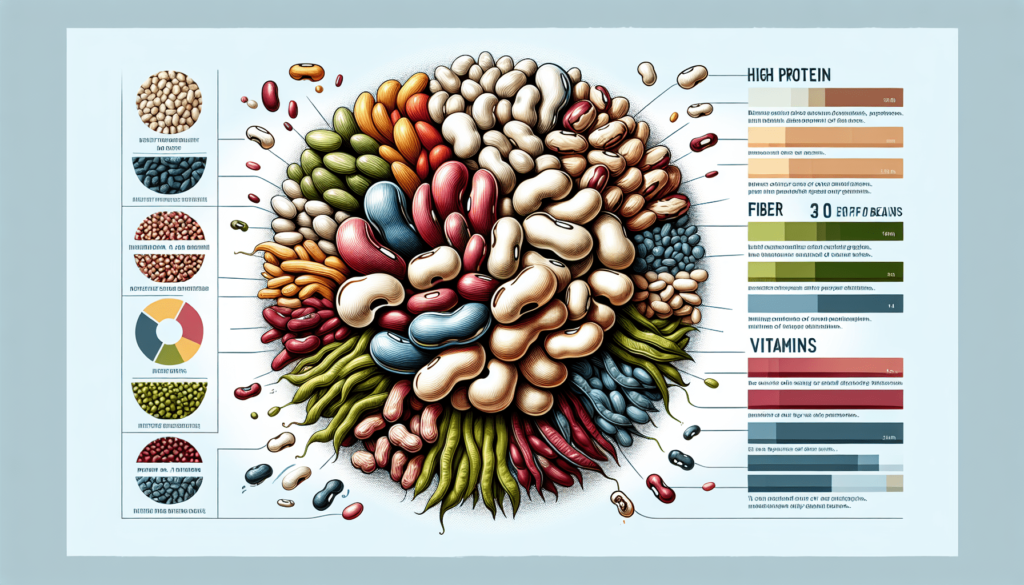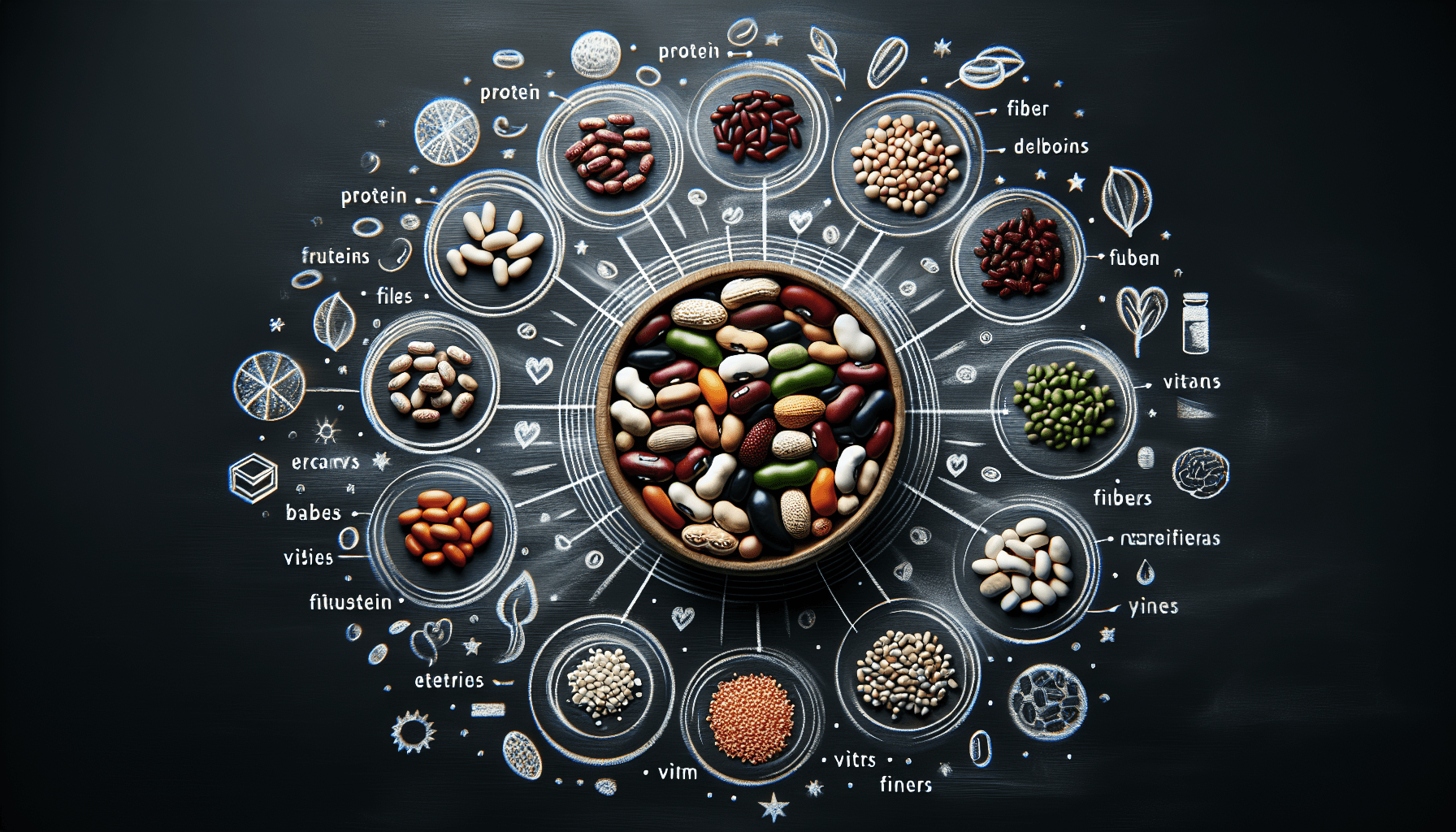Beans are a versatile and delicious addition to many dishes, but did you know they also offer a wide range of nutritional benefits? In this article, we will explore the various ways that beans contribute to a healthy diet and why you should consider incorporating them into your meal plans. From providing a rich source of protein to promoting heart health and aiding in weight management, the humble bean has much to offer when it comes to nourishing your body. So, let’s take a closer look at the nutritional perks of these little powerhouses and discover why they should be a staple in your kitchen.
Protein
Beans are an excellent source of protein, making them a valuable addition to any diet. Whether you follow a plant-based lifestyle or simply want to reduce your meat consumption, beans are a great alternative. They are considered a complete protein source, meaning they contain all nine essential amino acids that our bodies need to function properly. Protein is essential for muscle growth and repair, so incorporating beans into your meals can support your fitness goals and overall well-being.
Fiber
One of the significant benefits of beans is their high fiber content. Fiber plays a crucial role in promoting healthy digestion by bulking up the stool and aiding in regular bowel movements. This can help prevent constipation and promote a healthy gut. Additionally, consuming fiber-rich foods like beans can contribute to weight management. Fiber adds volume to your meals, leading to feelings of fullness and reducing the likelihood of overeating. Maintaining a healthy weight is not only essential for overall health, but it also lowers the risk of chronic conditions such as obesity and cardiovascular diseases.

Vitamins
Beans are abundant in B vitamins, which are essential for energy production and maintaining the health of your nervous system. These vitamins include thiamin, riboflavin, niacin, and folate. Folate, in particular, is crucial for pregnant women as it helps prevent birth defects in the developing fetus. Moreover, beans are a good source of vitamin K, which aids in blood clotting and helps maintain bone health. By incorporating beans into your diet, you can ensure that you’re getting a wide range of essential vitamins to support your overall well-being.
Minerals
When it comes to minerals, beans have a lot to offer. They are especially high in iron, a mineral necessary for the production of healthy red blood cells. Consuming iron-rich foods like beans can help prevent iron deficiency anemia, which can cause fatigue and weakness. Additionally, beans are a good source of potassium, which is essential for maintaining proper heart and muscle function. Furthermore, beans contain minerals like magnesium and zinc, which are essential for various bodily functions, including immune system support and wound healing. By including beans in your diet, you can ensure that you’re getting a wide range of essential minerals.

Antioxidants
Beans contain a variety of antioxidants, which are compounds that help protect your cells from damage caused by harmful molecules called free radicals. Antioxidants have numerous health benefits, including reducing the risk of chronic diseases such as heart disease and cancer. By consuming beans regularly, you can boost your antioxidant intake and potentially experience anti-inflammatory effects. These anti-inflammatory effects can help reduce the risk of diseases related to inflammation, such as arthritis and certain types of cancer. Adding beans to your diet can provide you with a delicious and nutritious way to protect your cells and support your overall health.
Lowering Cholesterol
Beans have been shown to have cholesterol-lowering effects, particularly in reducing LDL (bad) cholesterol levels. High levels of LDL cholesterol can contribute to the development of heart disease. By consuming beans regularly, you can help lower your LDL cholesterol levels and reduce the risk of cardiovascular diseases. This is particularly important for individuals aiming to maintain overall cardiovascular health. Incorporating beans into your meals can be a simple and effective way to support your heart health and decrease the risk of chronic conditions.
Blood Sugar Control
Beans have a low glycemic index, which means they don’t cause a rapid increase in blood sugar levels after consumption. This makes them an excellent food choice for individuals with diabetes or those looking to control their blood sugar levels. The steady release of glucose into the bloodstream provided by beans helps prevent blood sugar spikes and crashes. Including beans in your meals can contribute to better blood sugar control, promoting overall metabolic health and reducing the risk of complications associated with diabetes.
Weight Management
If you’re aiming to manage your weight effectively, beans can be a valuable addition to your diet. They are high in fiber, which promotes feelings of fullness and helps control hunger. By adding beans to your meals, you can increase your meal volume without significantly increasing the calorie content. Additionally, beans are low in calories and fat, making them a nutritious and filling option for weight loss efforts. By including beans in your diet, you can support your weight management goals while enjoying a variety of delicious and satisfying meals.
Digestive Health
Supporting digestive health is essential for overall well-being, and beans can play a significant role in achieving optimal digestive function. The high fiber content of beans promotes a healthy gut microbiome by providing nourishment for beneficial gut bacteria. A healthy gut microbiome has been linked to improved digestion, a stronger immune system, and even mental health benefits. Additionally, the fiber in beans helps improve bowel regularity, reducing the risk of constipation and supporting a healthy digestive system. Furthermore, the consumption of fiber-rich foods like beans has been associated with a reduced risk of colon cancer. Including beans in your diet can help maintain a healthy digestive system and promote long-term gastrointestinal health.
Bone Health
Beans are not only an excellent source of plant-based protein but also a good source of calcium, a mineral essential for maintaining strong and healthy bones. Calcium plays a crucial role in promoting bone density and preventing osteoporosis, a condition characterized by weakened and brittle bones. By consuming beans regularly, you can support your bone health and reduce the risk of fractures and bone-related issues. Including beans in your meals is a simple yet effective way to ensure that you’re getting an adequate intake of calcium, contributing to the long-term health and strength of your bones.
In conclusion, beans offer a wide array of nutritional benefits that can support your overall health and well-being. They are a complete protein source, making them an excellent plant-based alternative to meat and a valuable addition to any diet. Their high fiber content promotes healthy digestion, helps maintain a healthy weight, and reduces the risk of constipation. Beans are also rich in essential vitamins and minerals, including B vitamins, folate, iron, potassium, magnesium, and zinc. Moreover, beans contain antioxidants that protect against cell damage and may have anti-inflammatory effects. They support various aspects of health, including cardiovascular health, blood sugar control, weight management, digestive health, and bone health. By incorporating beans into your meals, you can enjoy their nutritious benefits while savoring their delicious taste and versatility. So, why not enrich your diet with beans and unlock their countless advantages for your well-being?

